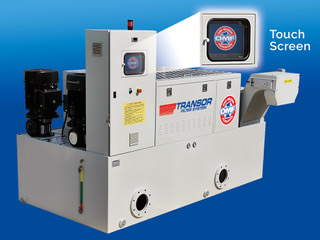V-Series Filtration Units
V-Series Filtration Units
The addition of touchscreen technology to the unit's control boxes will enhance communication with the machine operators. With a simple "touch", operators will be able to display many of the machine functions in real time.

Transor Filter will debut a number of improvements to their line of One Micron Filtration systems, including a new, improved design for their V-Series Filtration units that will be in booth 237440 at IMTS 2022.
According to Irv Kaage, Transor CEO, "We continue to innovate as a company. Because Transor's One Micron Filtration (OMF) delivers benefits to varied applications such as tool and cutter grinding, both carbide and HHS, lapping, EDM, carbide tipped saw blades and the like, we're constantly reviewing how to improve those end user experiences."
The addition of touchscreen technology to the unit's control boxes will enhance communication with the machine operators. With a simple "touch", operators will be able to display many of the machine functions in real time.
With the increase of automated and unattended machining, Transor's new automated sludge handling device replaces the traditional sludge box. This completely automated dragout system makes the capture and reclamation of valuable materials such as carbide easy and profitable.
For heavy stock removal applications such as HSS, the new Transor SR eliminates the need for a magnetic pre-filter. The unique design of the SR provides significantly enhanced backflushing of the elements and is offered for a single machine or as a centralized system.





